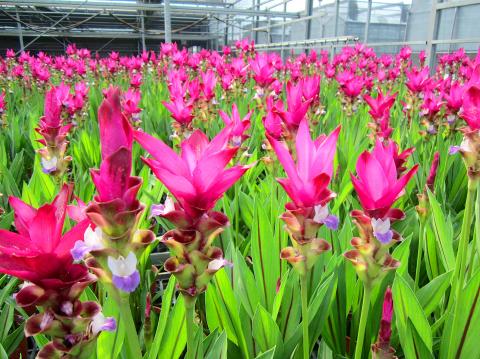The Council of Agriculture (COA) yesterday said it has bred a new species of Siam tulip in the hopes of reinvigorating the local flower industry and developed a paper test kit for detecting orchid viruses.
Native to Thailand and introduced to Taiwan in the late 1970s, the Siam tulip, or Curcuma alismatifolia, is not related to the tulip, but to various ginger species, such as turmeric, the council said, adding that the Siam tulip gets its name from its tulip-like flowering pattern and is one of the most ornamental flowers of the various ginger species; commonly sold as a cut flower that can last for more than 10 days.
The Siam tulip industry in Taiwan bloomed following the introduction of a pink-flowering variety in the late 1970s, but the industry has declined and the flower’s planting areas have reduced to about 5 hectares, the council said.

Photo: Supplied by the Kaohsiung District Agricultural Research and Extension Station
The decline has been linked to extreme weather and serious plant diseases, which have reduced the flower’s quality and farmers’ revenue, the council said, adding that the species available on the market have gradually lost their popularity and are generally only used as religious offerings.
To revive the industry, the council’s Kaohsiung District Agricultural Research and Extension Station has developed a new method of growing Siam tulips in off-ground planters in indoor facilities to reduce pest contact and boost petal quality. The station has also bred a new species of the flower that it says is better adapted to pot culture.
The new species would be named in the near future, after which the council is to develop and promote products based on it.
Separately, the council has developed a screening technology to diagnose orchid pathogens and antigens, which has been transferred to a private biotechnology firm to develop a paper test kit.
The council said it had developed seven kinds of orchid virus reagents, which have been used to screen orchid seeds and seedlings, as well as inspect exported plants.
Taiwan’s orchid industry is a competitive export sector and an elaborate division of labor has been developed: including seed conservation; systematic culturing and taming of wild orchid species; planting management; packaging and marketing, the council said, adding that the new testing kit would improve the supply chain and boost the industry’s competitiveness.
The council said that testing could become an industry given the technologies and patents that Taiwan has developed.

Three Taiwanese airlines have prohibited passengers from packing Bluetooth earbuds and their charger cases in checked luggage. EVA Air and Uni Air said that Bluetooth earbuds and charger cases are categorized as portable electronic devices, which should be switched off if they are placed in checked luggage based on international aviation safety regulations. They must not be in standby or sleep mode. However, as charging would continue when earbuds are placed in the charger cases, which would contravene international aviation regulations, their cases must be carried as hand luggage, they said. Tigerair Taiwan said that earbud charger cases are equipped

Foreign travelers entering Taiwan on a short layover via Taiwan Taoyuan International Airport are receiving NT$600 gift vouchers from yesterday, the Tourism Administration said, adding that it hopes the incentive would boost tourism consumption at the airport. The program, which allows travelers holding non-Taiwan passports who enter the country during a layover of up to 24 hours to claim a voucher, aims to promote attractions at the airport, the agency said in a statement on Friday. To participate, travelers must sign up on the campaign Web site, the agency said. They can then present their passport and boarding pass for their connecting international

Taiwan sweltered through its hottest October on record, the Central Weather Administration (CWA) said yesterday, the latest in a string of global temperature records. The main island endured its highest average temperature since 1950, CWA forecaster Liu Pei-teng said. Temperatures the world over have soared in recent years as human-induced climate change contributes to ever more erratic weather patterns. Taiwan’s average temperature was 27.381°C as of Thursday, Liu said. Liu said the average could slip 0.1°C by the end of yesterday, but it would still be higher than the previous record of 27.009°C in 2016. "The temperature only started lowering around Oct. 18 or 19

WEATHER Typhoon forming: CWA A tropical depression is expected to form into a typhoon as early as today, the Central Weather Administration (CWA) said yesterday, adding that the storm’s path remains uncertain. Before the weekend, it would move toward the Philippines, the agency said. Some time around Monday next week, it might reach a turning point, either veering north toward waters east of Taiwan or continuing westward across the Philippines, the CWA said. Meanwhile, the eye of Typhoon Kalmaegi was 1,310km south-southeast of Oluanpi (鵝鑾鼻), Taiwan’s southernmost point, as of 2am yesterday, it said. The storm is forecast to move through central